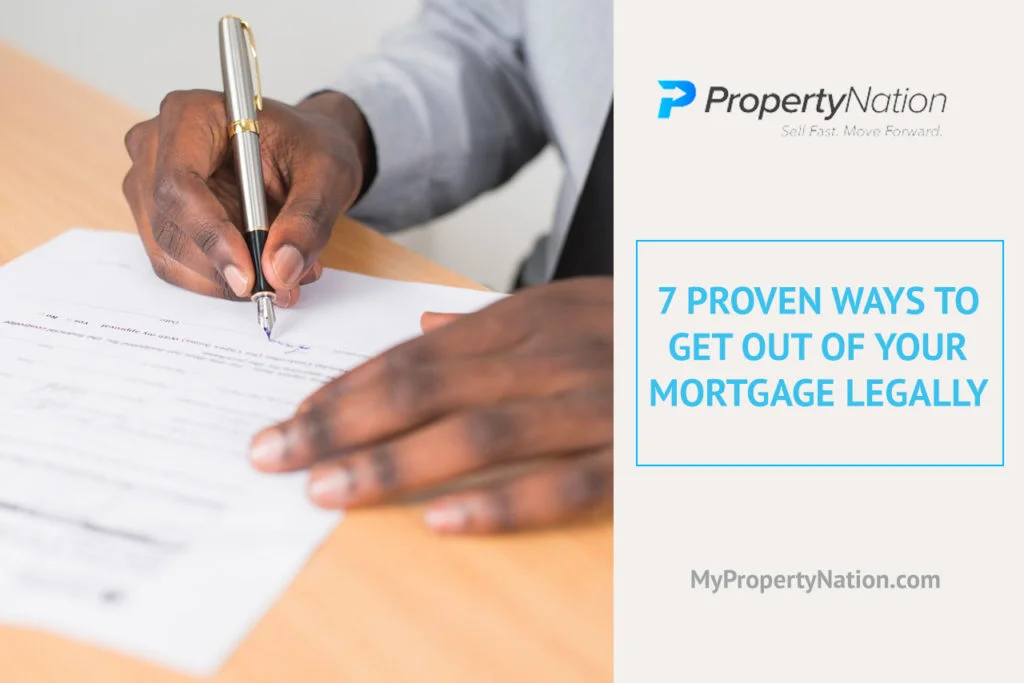Updated: March 22, 2022
While you may have every intention of honoring your mortgage and continue paying it in its entirety, sometimes life throws a wrench into the engine and you need to get out of your mortgage. Maybe you lost your job, you’ve become disabled, or market conditions change and you end up paying a mortgage worth more than your house.
One thing is sure, deciding to get out from a mortgage is always super stressful. Therefore it’s always wise to be prepared in advance so you can make calm and wise decisions if you must face this situation. It can be very easy to feel overwhelmed if you have to figure things out while you’re in the thick of things.
The good news is that you have lots of options available besides going into foreclosure. We’ll analyze seven of them. This is not an exhaustive list by any means, but it’s a good place to begin research.
1. Hire a Real Estate Agent to Sell Your Home
Contents
Let’s get the obvious one out of the way. If you have the right circumstances, and you can live off your savings for at least six months, you could try selling your home. Selling your home the traditional way, a.k.a. hiring a real estate agent to sell it, can be a good option if your local area is in the middle of a seller’s market, and the supply of housing is limited. Because you’re in a hurry to sell your home, it’s essential to price your property to sell from the beginning.
2. Deed In Lieu of Foreclosure
A deed in lieu of foreclosure is a legal and binding document that transfers ownership from the homeowner to the lender that holds the mortgage. In exchange, the lender releases the borrower from the burden of their mortgage. The lender will then sell the property later to recoup losses.

If a foreclosure is inevitable, lenders are usually open to this option because it saves them time and money that come with a traditional foreclosure. While you usually won’t be required to pay the difference not covered by the value of the house, in some states you might be still on the hook for it. If you consider this option, it’s a good idea to contact a real estate attorney to get all the details and caveats to consider in your specific case
3. A Short Sale
Simply put, a short sale is when you sell your home a discount, below the value of your mortgage. Before you’re allowed to do a short sale, you need permission from your bank. You will also be required to submit a “hardship letter”. This letter should explain in detail why you can’t make your mortgage payments anymore, as well as financial and medical records that back your claims.
If your lender agrees to the short sale, then the process itself is very much as usual. You hire a real estate agent, you list your home, and wait for offers. But once you get an offer, your lender will have to approve it.
Short selling a home is not ideal, consequence-free solution. Your credit score will still take a hit, and it will remain in your credit history for many years. It is not nearly as bad as bankruptcy or foreclosure. There are also some economic advantages. During a normal real estate transaction, the seller pays all real estate commissions and many closing costs. In a short sale, the seller pays nothing. The lender is the one who pays those fees.
4. If Your Loan is FHA –Insured, Look For Government Assistance.
Depending on your mortgage terms, you may be able to get help from the FDH, Veterans affair, or the U.S. Department of Agriculture. If you’re eligible, the FHA Home Affordable Modification Program can help you avoid foreclosure by helping you lower your monthly payments. If you just want to be done with your mortgage and find a more affordable home, they might be able to work with your lender to get you out of your home into a more affordable one.
5. Refinancing Your Home to Get Out Your Mortgage
If the main reason you want to get out of your mortgage is the high monthly payments you have, but you still wish to stay in your current home, you could consider refinancing. In order to qualify for refinancing, you need to have a good credit score, your house needs to have a certain amount of equity accumulated, and you’ll need to meet certain employment and financial requirements depending on your lender
The process itself is basically the same as when you obtained your original mortgage. You’ll also be technically starting from zero on a loan, and you’ll be paying a lot more in interest in the long run, but your monthly payments will be lower, and your credit score will remain untouched.
Remember though that because you’re starting a new loan, you might be liable for loan origination, closing, appraisal and application fees.
6. Speak With Your Lender About a Forbearance Program or Loan Modification
If you know that in the near future you won’t be able to make your mortgage payments, you can ask your lender for an application for a loan modification. Just like in a short-sale, you will need to draft a letter of hardship in which you explain in detail why you cannot continue to make your monthly payments. In this letter, you need to explain how you got into your hardship, how you have tried to improve your situation, and why there’s no way to escape your current hardship.
If the bank accepts your application, they may suspend your payments temporarily, reduce your payments, or modify your interest rates.
While it’s almost guaranteed that in the long run, you’ll end up paying more in interest, a forbearance program will give you the opportunity to avoid foreclosure.
7. Sell Your Home Directly to a Real Estate Investor
Another option can be to find a real estate investor looking for wholesale properties. Investors are not hard to find. Keep in mind not all real estate investors are looking out for your best interest. It is very easy to get scammed if the wrong investor sees you as an unknowing homeowner. Make sure to look for an accredited investor or investment company like Property Nation. Offers from certain real estate investors are actually quite fair if you keep in mind how quickly you can get through the process with them, and how you won’t have to pay any agent’s fees. Many times you will get even more than you would by selling via the traditional route.
Want Help?
We hope that you’re never forced to terminate your mortgage due to an emergency, but if you ever find yourself to do so, time is always of the essence. Here at Property Nation, we can help sell house fast Miami and we buy homes in Fort Lauderdale, or anywhere in Florida.
Skip all the hassle of dealing with banks, paying agent fees, and other headaches. You won’t have to pay any fees, and you’ll get a fair offer in less than 24 hours.
If you’re interested in learning more about the process, give us a call at 305-928-2711, or send us an email to info@mypropertynation.com.




